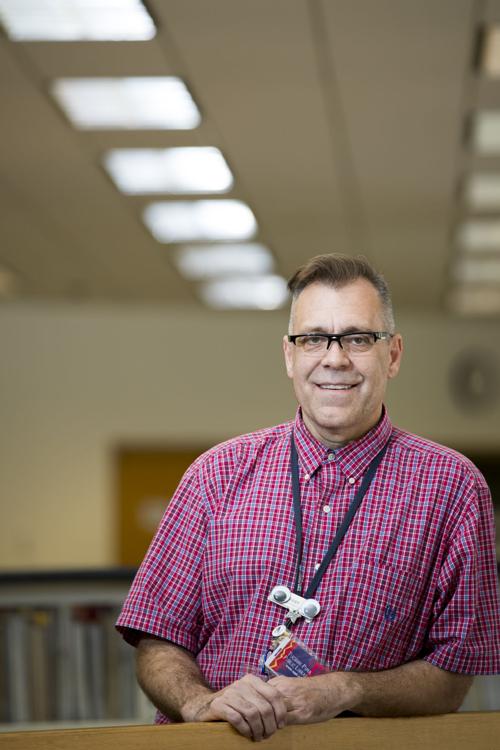This is the latest in a series about what’s going on in the Pima County Public Library.
Every day, widely diverse populations visit our libraries to find answers, participate in activities and connect with others. We offer a thriving space where all are welcome, including those who are new to our country and our community.
The library has long been a supportive place where immigrants of all backgrounds turn for access and information, but thanks to the Welcome to America Team, the library is now engaging immigrants earlier and with targeted programming and services to help them adjust to life in Tucson.
I first got professionally involved with immigrant and refugee issues in the early 1980s. But my reasons for doing so go back to my childhood.
In my youth I experienced a sense of dislocation similar to, but on a much smaller scale, what I imagine many of our newly-arrived community members feel. I grew up in the diverse inner city of Dayton, Ohio, but when school districts began busing students from all over the city, my family moved to the suburbs.
People are also reading…
I felt isolated and disconnected, and my confusion about my emerging LGBTQ identity led to feeling invisible. Strangely, I couldn’t articulate how separate I felt from other kids, nor could I communicate my displeasure with living in a new environment where everyone else looked the same.
Discovering the suburban branch of the Dayton Public Library near my junior high school was like finding a sanctuary. I felt safe there. I could do homework (which I didn’t do a lot of), read magazines and play checkers with other disenfranchised kids. I was also shushed often for talking too loudly or too much.
Years later I was still too loud and talked too much, but I was also actively involved in my own LGBTQ community and learning more about how marginalized groups rely on visual cues (signage and symbols) inclusive language (gender neutral vocabulary) and connectedness (commonality amongst one’s peers) in order to fully participate in mainstream institutions.
While finishing my undergraduate degree, I accepted a part-time volunteer coordinator position in the St. Paul Public Schools (SPPS), where I trained volunteers to work with adult refugee students in English as a Second Language (ESL) classrooms. It didn’t take long before I was hooked on working with refugees.
In Minneapolis and St. Paul, many churches and community groups did a lot of work sponsoring refugees from Laos, Vietnam, Cambodia and Somalia. After completing my degree in community studies, I was assigned by SPPS to work with the Hmong Mutual Assistance Association to write and coordinate a federal Title VII grant that served 300 Hmong families residing in Saint Paul Public Housing.
As a Pima County Public Library employee, the Welcome to America Team was an easy fit for me. I first became interested while working at the Santa Rosa Library and getting to know many East African families who spent time there.
The Welcome to America Team is a group of staff members from the libraries most frequented by refugee and immigrant customers. The team works to reduce and eliminate barriers so that these customers can learn to easily access timely and accurate information. Since many new arrivals are unaware of all that libraries have to offer, we also work hard on outreach and educating families about the free services we provide.
I’m proud of all that the Welcome to America Team has accomplished. Pima County Public Library now has a telephone translation service, which provides help in 200 different languages. In addition to English and Spanish, our collection now includes materials in Arabic, Somali, Chinese, Farsi/Persian, Swahili and French.
We’ve made Welcome to the Library videos available in multiple languages, including Arabic, Maay Maay and Nepali. We host English Language Learning and Citizenship classes, and coordinate with local refugee agencies. We also offer citizenship tables where customers can get answers to commonly asked questions in person.
Numerous libraries have Citizenship Corners with a variety of materials to help anyone pursuing their citizenship. At the Joel D. Valdez Main Library we offer tours to refugee groups, helping them apply for library cards, learn how to borrow from the Seed Library, and find details for upcoming citizenship and English classes. Parents enjoy touring the children’s area where they can check out books for their children in their native language.
Our mission is to transform lives by educating, inspiring, and connecting people. And that means all people. As a child, I found my sense of belonging within the walls of a library. Today, I take pride in knowing I am helping others in much the same way.
Geoffery Blanton is a library associate at the Joel D. Valdez Main Library. He considers himself a “jack-of-all-trades” working within educational institutions and nonprofit organizations. He’s been a refugee volunteer coordinator, an education director for Hmong families, a primary school teacher, a school district LGBT coordinator, and a noncredit program coordinator at Pima Community College.
















